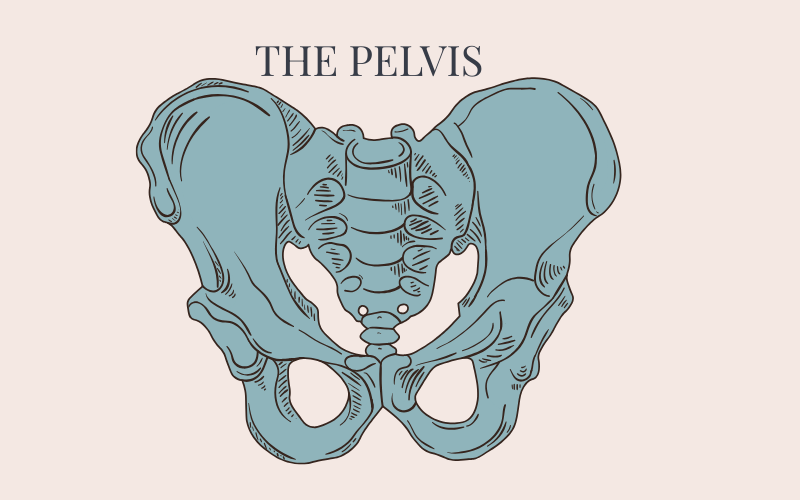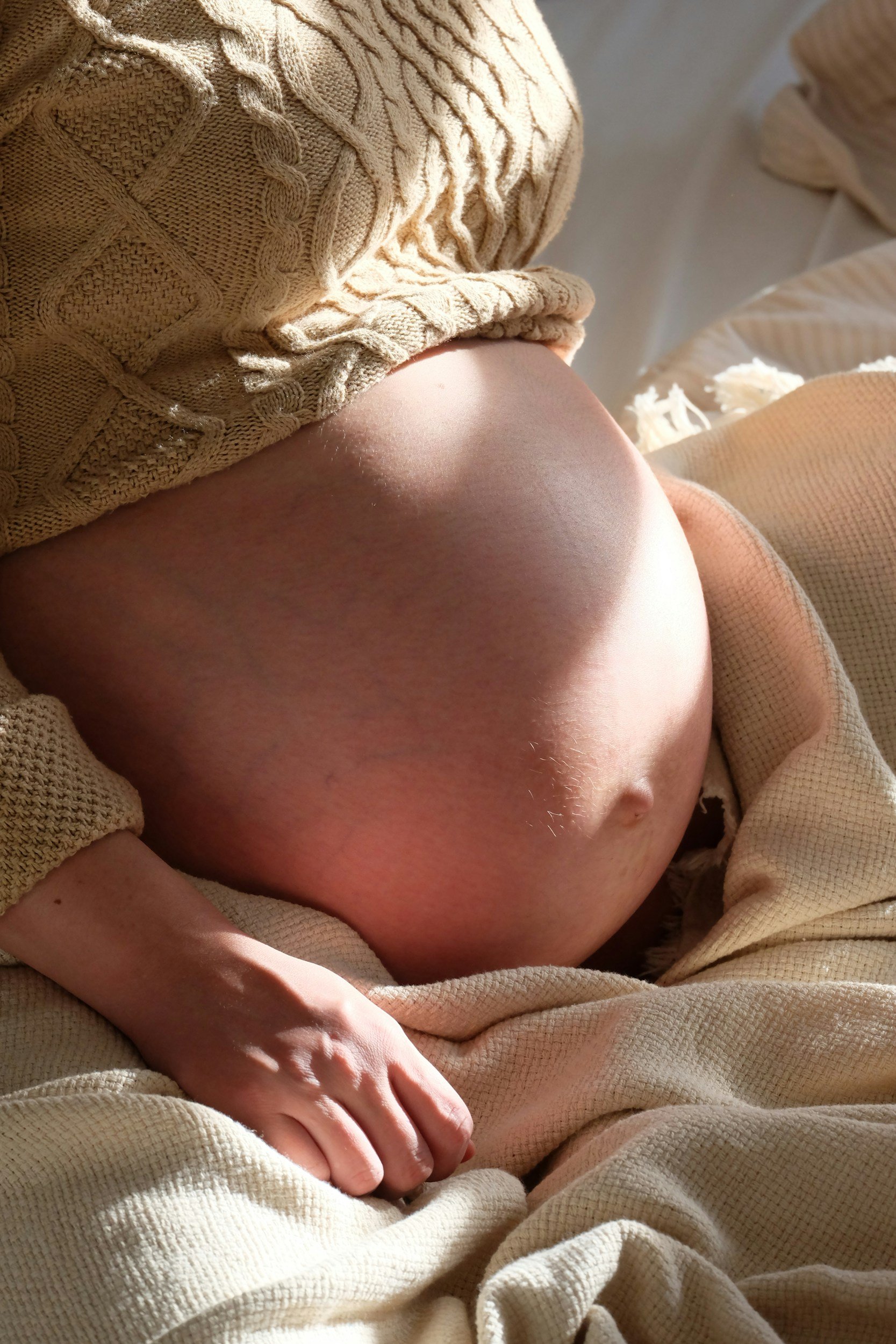
Why the Vagus Nerve Matters in Pregnancy — and How to Support It
Most of us think of pregnancy in terms of hormones, scans and growing bellies — but there’s another biological system quietly shaping how your body adapts, responds to stress, and even how you feel emotionally: the vagus nerve.
The vagus nerve — also called cranial nerve X — is the longest and one of the most important parts of the parasympathetic nervous system. It acts as a major communication highway between your brain and your organs, including the heart, lungs, and digestive system. It helps regulate involuntary functions such as heart rate, breathing, digestion, inflammation, and immune responses.

The Science of Self-Care in Pregnancy, Postpartum & Motherhood: Why It Matters for Both Mother and Baby
Pregnancy, the postpartum period and early motherhood are often described in emotional terms — joyful, overwhelming, transformative — yet they are also some of the most physiologically demanding stages of life. Behind the scenes, a mother’s body is navigating profound hormonal shifts, nervous system changes, tissue healing, disrupted sleep and an increased cognitive and emotional load.
In this context, self-care is not indulgent. It is biologically necessary. Increasingly, research shows that when women are supported to regulate stress, rest and recover — alongside receiving appropriate medical care — outcomes improve not only for mothers, but for babies and families too.

The Gut-Brain Axis: Why Your Microbiome Might Be Driving More Than Just Digestion
You’ve likely heard the phrase "gut feeling"—but what if we told you your gut was literally talking to your brain? That’s not just poetic, it’s biological. Welcome to the world of the gut-brain axis—an intricate, two-way communication system between your gut microbiome and central nervous system.
This connection influences far more than digestion. It has a proven role in regulating your mood, cognition, immune function, energy levels, hormonal signalling, and even reproductive health. During times of immense physiological change—like pre-conception, pregnancy, postpartum, and hormonal transitions—this axis becomes even mor

Instruments Used in Birth: What They Do, When They’re Used, and Why Understanding Them Matters
Instrumental birth is one of the most poorly understood aspects of modern maternity care. For many parents, forceps or ventouse are only introduced at the point they are recommended — often during an intense, time-pressured moment.
Yet these tools have clear clinical indications, specific mechanical functions, and predictable implications for birth experience and recovery. Understanding them antenatally allows parents to engage with decisions from a place of knowledge rather than fear.

Preparing for a Winter Pregnancy: Nutrition, Body Care & Wellbeing Tips
Winter brings cosy evenings, festive routines, and plenty of nourishing food — but it can also pose unique challenges for pregnant women. Colder temperatures, fewer daylight hours, an increase in seasonal viruses, and drier indoor heating can all impact your comfort, immunity, and overall wellbeing during pregnancy.
This guide brings together nutrition, body care, and wellbeing practices to help you feel supported, energised, and protected throughout the winter months.

Understanding hCG and Progesterone: Your First Pregnancy Hormones
When you first become pregnant, your body undergoes a remarkable hormonal transformation — a delicate, finely tuned process that sustains early pregnancy and supports the development of new life. Two key hormones take the lead in these first crucial weeks: human chorionic gonadotropin (hCG) and progesterone. Understanding their roles helps explain everything from positive pregnancy tests to the early pregnancy symptoms many women experience.

The Truth About Private Pregnancy Scans: What the Latest BBC Report Means for You
A recent BBC News investigation has put private pregnancy scan clinics under the spotlight, revealing serious concerns about unregulated providers giving false reassurance and missing critical issues in pregnancy.

Vitamin B12 in Pregnancy and Postpartum: Why It Matters More Than You Think
When it comes to pregnancy nutrition, iron, folate, and vitamin D often take the spotlight — but there’s another nutrient that deserves just as much attention: vitamin B12.
This powerhouse vitamin supports everything from your baby’s brain development to your own energy, mood, and recovery. Here’s what every parent should know.

Birthing the Placenta: What to Expect and What You Need to Know
When we talk about labour and birth, most people’s minds jump to the moment the baby arrives. But labour isn’t truly complete until the placenta has been birthed. This third stage of labour is just as important as the first two—and understanding your choices, what might happen, and how it’s managed can help you feel calmer and more prepared.

The Pelvis in Pregnancy and Labour: Structure, Function and Adaptation
The human pelvis plays a central role in pregnancy and labour. It forms the bony passage through which a baby is born, while also adapting throughout pregnancy to support the growing uterus. Understanding the anatomy and function of the pelvis can empower women and birthing people to approach labour with greater knowledge, confidence and trust in their bodies.

Pressure Points of Calm: Reflexology’s Role in Pregnancy
Pregnancy is a time of profound change — not only physically, but emotionally and mentally. Many expectant mothers explore complementary therapies to ease discomfort, reduce stress, and prepare for birth. Among these, reflexology has gained particular interest as a gentle, non-invasive option. But what exactly is reflexology, and what does science say about its role in pregnancy?

Pregnancy Brain: What Science Says About Forgetfulness and Focus in Motherhood
If you’ve ever walked into a room while pregnant and forgotten why you went there—or found yourself searching for your keys while holding them—it’s tempting to blame it on “pregnancy brain.” But is this foggy-headed feeling just a cultural myth, or is there real science behind it?

Circadian Rhythms and Labour Timing: Does the Body Know When to Birth?
Discover how circadian rhythms, light exposure, and birth hormones influence the natural timing of labour. Learn why many births begin during the night.

The Latent Phase of Labour: Why It’s Misunderstood and Often Overlooked
When people imagine labour, they often think of dramatic contractions, waters breaking, and a quick dash to hospital. But labour often begins in a much quieter, more subtle way—this is known as the latent phase.

Pregnancy and the Immune System: How the Body Protects Both Mum and Baby
Pregnancy is a time of extraordinary biological transformation. Beneath the visible changes in your body lies a powerful, intricate process that ensures both your health and your baby's development: the adaptive behaviour of your immune system.

Caffeine Alternatives for Mums-to-Be: Energise Safely
Pregnancy is a time of incredible transformation—physically, emotionally, and hormonally. And while a cup of tea or coffee might be your usual go-to for a morning boost, it’s worth revisiting your caffeine intake to make informed, feel-good choices that support both you and your growing baby.

Maternity Clothes: What You Actually Need
Pregnancy is one of life’s most exciting chapters — but shopping for maternity clothes can feel overwhelming. With changing body shapes and so many brands to choose from, it’s easy to overbuy or overspend. The good news? You don’t need to buy everything labelled “maternity.”

Male Fertility Matters Too: Common Myths and Facts
When it comes to fertility, the conversation too often centres solely on women. But the reality? Male fertility accounts for nearly half of all conception challenges. At the Bubba and Me Club Clinic in Tunbridge Wells, we offer an integrated fertility nutrition service designed to support both partners—with personalised, practical care rooted in science and compassion.

Breastfeeding and the Vaginal vs. Abdominal Birth Connection: What the Science and Heart Say
Welcoming a baby into the world is one of life’s most profound moments. Whether born through the natural rhythm of vaginal birth or the surgical precision of a caesarean section, each birth story is unique, powerful, and deeply personal. But as research increasingly shows, the way a baby enters the world can influence early feeding experiences, microbiome development, and even immune resilience.
This isn’t about prescribing a “right” way—there is none. It’s about awareness, support, and understanding that all parents, regardless of how they give birth or feed their baby, can create a nurturing start for life.

My Cervix Wasn’t Cooperating: What I Learned About Effacement, Ehlers-Danlos, and the Cervical Stitch
I never thought much about my cervix—until pregnancy made it the main character in my story. Living with Ehlers-Danlos Syndrome (EDS), hypermobility type, I knew my connective tissue was different. What I didn’t expect was for it to affect the integrity of my cervix—and nearly cost me my pregnancy.

